Local
4 marriage ballot fights and 4 big wins
Advocates confident of sweep in Md., Maine, Minn., Wash. battles
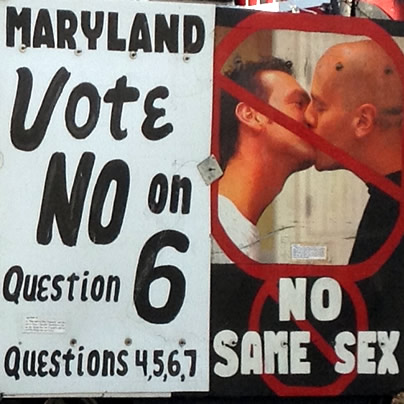
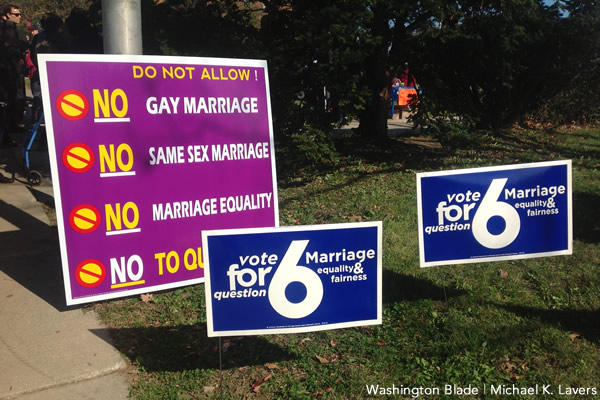
Question 6 supporters and opponents placed signs outside a polling place at Northwood Elementary School in Baltimore on Nov. 6. (Washington Blade photo by Michael K. Lavers)
Advocacy groups across the country on Tuesday celebrated the passage of two state same-sex marriage referenda and the defeat of a proposed constitutional amendment that would have banned nuptials for gays and lesbians in another.
Maryland voters supported Question 6 by a 52-48 percent margin, while Maine’s Question 1 that will allow gays and lesbians to legally marry in the state passed with 52 percent of the vote. Washington’s Referendum 74 that would uphold the state’s same-sex marriage law remains ahead by a 52-48 percent margin with what Washington United for Marriage estimates as 60 percent of the ballots counted as of deadline.
Minnesotans narrowly defeated a proposed state constitutional amendment that would have defined marriage as between a man and a woman by a 51-48 percent margin.
“Years from now we’ll remember this Election Day as the most important and the most historic in the history of the LGBT movement,” said Chad Griffin, president of the Human Rights Campaign, in a video message. He noted HRC contributed $20 million over the last two years to the four statewide same-sex marriage campaigns. “We’ve won a landslide victory at the ballot box. We’ve secured the first ever electoral victory for marriage equality in Maine, Maryland and Minnesota. And we’re optimistic about the results still to come in Washington state.”
Freedom to Marry gave $4.6 million to the four statewide same-sex marriage campaigns. It helped raise another $2.4 million to support public education campaigns in Maine, Maryland, Minnesota and Washington.
Evan Wolfson, president of Freedom to Marry, categorized the election results to the Washington Blade as “irrefutable momentum in favor of the freedom to marry” that will give “enormous confidence” to lawmakers and others to support nuptials for gays and lesbians. Casey Pick of Log Cabin Republicans further described the election results as a “turning point.”
“It is something the nation will take notice of,” she told the Blade from Maine where she had been working with Mainers United for Marriage in support of Question 1 for the last two weeks. “Never again will opponents of marriage equality be able to say that every time the people vote on the issue they favor marriage as one man and one woman because that’s no longer true.”
LGBT advocates in other states where voters did not consider same-sex marriage ballot measures also noted the historic results.
“For all of the families in Maine and Maryland, where voters upheld the rights of same-sex couples to wed, MassEquality is pleased that they will soon experience what we have celebrated for eight years now in Massachusetts: families that are stronger and communities that are healthier because LGBTQ individuals and their families are treated with dignity and fairness,” said Kara Suffredini, executive director of MassEquality, in a statement. She noted nearly 20,000 gay and lesbian couples have married in Massachusetts since the commonwealth’s same-sex marriage law took effect in May 2004. “Our rights should never be determined by a majority vote. But the wins in Maine and Maryland, as well as the defeat of a proposed anti-marriage Constitutional amendment in Minnesota, are definitive proof that there is a growing majority in America that supports our rights, and that equality wins, including at the ballot box.”
Equality Illinois CEO Bernard Cherkasov also noted the historic election results after Maine’s Question 1 passed.
“The ballot box victory is the latest evidence that the tide has turned and that momentum is on the side of full LGBT equality,” he said. “We now have a president who ran on support for marriage equality, a Democratic Party that included a marriage plank in the party platform, seven states, including Maine, and also the District of Columbia where same-sex couples can marry.”
Minneapolis resident Kirsten Olson and her partner of 18 years, Karen Hogan, a librarian at Quatrefoil Library in nearby St. Paul, waited for the Amendment 1 results at home. She awoke both Hogan and their 11-year-old daughter around 1:45 a.m. when she finally heard the proposal had failed.
“Public radio went to the victory speech that I didn’t think I would hear uttered,” said Olson as she became emotional. “It was just completely surreal and then on Minnesota Public Radio they were also talking about how the Minnesota House and the Minnesota Senate have both gone Democratic and that our governor, Mark Dayton, had on his agenda to legalize same-sex marriage. So in the span of 12 hours we went from the very real possibility of a constitutional amendment to a very real possibility of legalization.”
An ABC News/Washington Post poll conducted after President Obama endorsed marriage rights for same-sex couples in May found 53 percent of Americans supported nuptials for gays and lesbians, compared to only 36 percent in 2006. Even among social conservatives, the issue seems to have less resonance.
Only 19 percent of those who took part in a straw poll at the annual Conservative Political Action Committee conference in D.C. in February cited the promotion of “traditional values” as the most important issue going into the election. Only one percent who took part in the 2011 CPAC straw poll said stopping same-sex marriage was their top priority.
“Obviously we are very disappointed in losing four tough election battles by narrow margins,” said National Organization for Marriage President Brian Brown in a statement.
NOM contributed more than $5.5 million to oppose same-sex marriage referenda in Maine, Maryland and Washington and support Minnesota’s proposed constitutional amendment to ban nuptials for gays and lesbians. Brown conceded supporters and opponents of these respective ballot measures outspent those who opposed marriage rights for same-sex couples by at least a four-to-one margin.
He also downplayed the idea the election results are what he described as a “changing point in how Americans view gay marriage.”
“Though we are disappointed over these losses, we remain faithful to our mission and committed to the cause of preserving marriage as God designed it,” said Brown. “Marriage is a true and just cause, and we will never abandon the field of battle just because we experienced a setback. There is much work to do, and we begin that process now.”
Wolfson dismissed the remarks.
“It’s been clear for some time that they lost the argument,” he told the Blade. “All they have is scare tactics, diversions and some raw power in being able to throw money and mobilize some people — a dwindling number. They’re going to keep at it. That’s where their livelihood is. They know they’re losing. They know they’re on the wrong side of history. The opposition will continue, but we are winning.”
Pick said she feels the election results send a message to GOP lawmakers who continue to oppose marriage rights for same-sex couples.
“Log Cabin Republicans have been saying for a long time that the tide is turning on this issue,” she said. “For our party it is incumbent upon us to recognize that inclusion is the way of the future. And to be victorious and to win future elections with voters who are taking their place as the majority of the populace today, marriage equality has to be a part of that formula.”
Back in Maryland, there was a palpable sense among those awaiting the Question 6 results at a Baltimore concert hall the Free State was about to make history as the first state to approve same-sex marriage at the ballot.
Lesbian state Del. Heather Mizeur told the Blade before Marylanders for Marriage Equality announced the referendum had passed she feels Obama’s support of same-sex marriage had a tremendous impact in Maryland.
“While we already felt very confident where we were headed in this campaign, he stood up and did something no president has ever done for our community and help make it okay for all of our allies to be comfortable with being public about what their position was about equality,” she said. “We started to see the numbers very strongly in our direction after he came out in favor of it. And that’s why we’re hoping for a double win tonight and celebrating our marriage equality and also sending this courageous president back for another four year term.”
Olson said most of her friends, family and neighbors understand Minnesota voters made history by striking down the proposed amendment.
“People totally understand that, totally feel that,” she said. “There are obviously 49 percent of the population — or 48 percent I guess is what it finally came out to be who think otherwise, but they’re not 50 percent plus one.
Shaun Knittel, executive director of the pro-Referendum 74 group Social Outreach Seattle, told the Blade he feels this sense of history prompted a lot of young first-time voters to go to the polls and support the law.
“Nov. 6, 2012, is going to be a historic day for the gay community, the LGBTQ community because this is the time we stopped the bigots,” he said. “It’s the first time it has happened in this way and it was such a big statement. It wasn’t just one state or one group that just seemingly got lucky. It was four states involved in this.”
Maryland
Silver Spring holds annual Pride In The Plaza
‘Today means inclusion. It means to build resilience’

Silver Spring’s annual Pride in the Plaza event took place on Sunday to celebrate the LGBTQ community and emphasize inclusion and resilience.
“Today means inclusion. It means to build resilience, love,” Robyn Woods, program and outreach director for Live In Your Truth, which organized the event, said. “I mean, just being surrounded by the community and so many great entrepreneurs, business owners, and just being a part of this whole rainbow coalition that we call the LGBTQIA to be about.”
With the event being her first time organizing for Live In Your Truth, Woods said she felt emotional to see the support and love at the event.
“Some people (are) bringing out their children, their babies, their grandparents,” Woods said. “It’s a lot more allies here than anything else. That type of support to me means so much more than just support from my community; just outside support, inside support, so much support around it, so much love. Everyone’s smiling outside, helping each other.”
Attendees of the event were able to head over to the Family Fun Zone, an air-conditioned Pride Cool Down Lounge, or watch live drag performances in the main stage area.
Along with entertainment and a shaved-ice stand, rows of information tables stood along the plaza, including FreeState Justice, the Washington Spirit, Trans Maryland, Moco Pride Center, and the Heartwood Program, an organization that offers support, therapy, education, and resources to the LGBTQ community.
“I want people to know about our services, and I love what we have to offer,” Jessica Simon, psychotherapist for Heartwood Program’s Gender Wellness Clinic, said. “I (also) want to be part of a celebration with the community, and so it feels good to be here with other people who have something they want to give to the community.”
She added that within today’s political climate, to which she called an “antidote to shame,” it’s important to be celebrating Pride.
“There’s a lot of demonization of LGBTQI people,” Siena Iacuvazzi, facilitator for Maryland Trans Unity, said. “(Pride) is part of the healing process.”
Iacuvazzi said she was taught to be ashamed of who she was growing up, but being a part of a community helped her flourish in the future.
“I was taught how to hate myself. I was taught that I was an abomination to God,” she said. “But being a community is like understanding that there are people who have experienced the same thing, and they’re flourishing. They’re flourishing because they’re willing to stand up for themselves as human beings and discover themselves and understand what’s true for themselves.”
She added that Pride allows for a mutual understanding to take place.
“It’s more of a sense of belonging … and just taking that home and understanding you’re not alone,” Iacuvazzi said. “We’re each taking our own journey — we’re not putting that on each other. It’s just walking away with a sense of belonging and humanity.”
Similar to Iacuvazzi, Woods said she hopes attendees’ biggest takeaways would be family, fun, resilience, and pride.
“Being proud of yourself, being happy for who you are, and representation and how much it matters,” she continued. “And I think all these young people that are walking around here get to see versions of themselves, but older. They get to see so many different lesbian, gay, bisexual, pansexual people that are successful, that are showing love, that care, and it’s not how we’re portrayed in the media. It’s lovely to see it out here. (It’s) like we’re one big old, happy family.”
Virginia
Spanberger touts equality, reproductive rights in Arlington
Democratic Va. gubernatorial nominee made campaign stop at Freddie’s Beach Bar
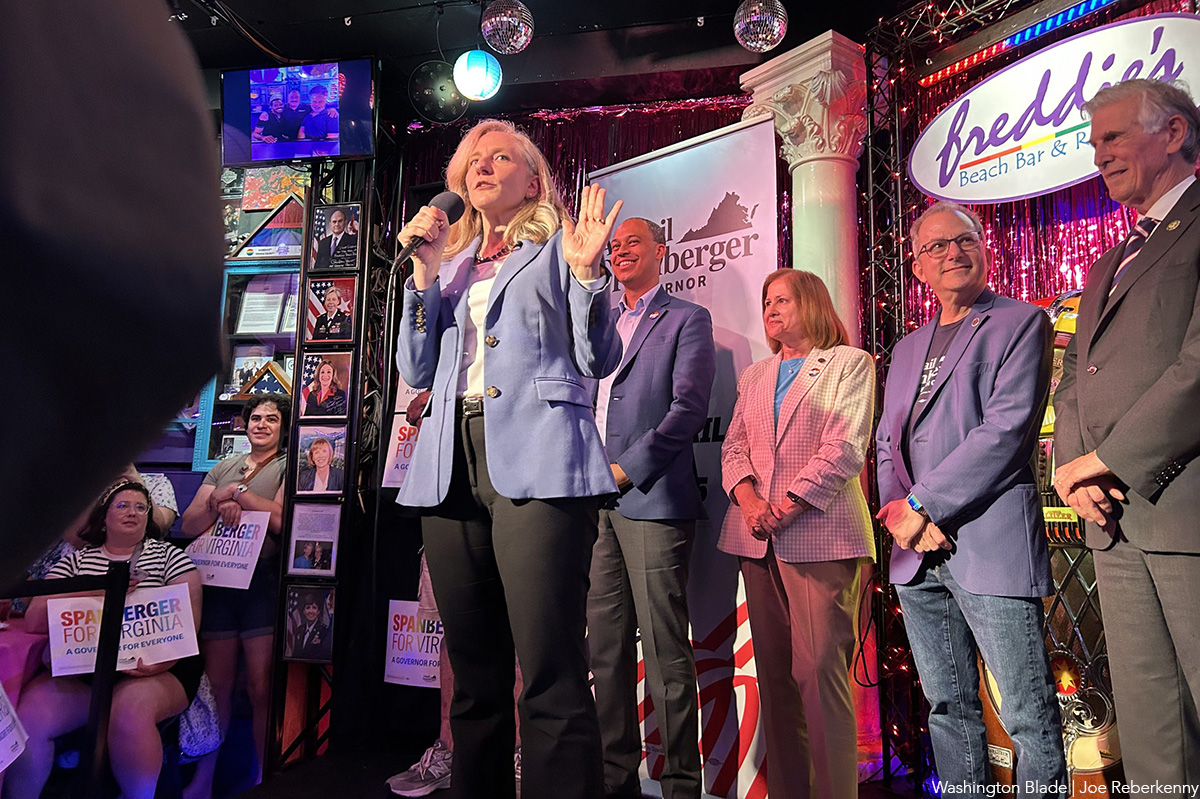
With the general election heating up and LGBTQ rights under increasing threat nationwide, Virginia gubernatorial candidate Abigail Spanberger brought her “Span Virginia Bus Tour” to Arlington’s Freddie’s Beach Bar for a campaign stop filled with cheers, policy pledges, and community spirit.
Spanberger, who served three terms in the U.S. House of Representatives from 2019 through early 2025 for Virginia’s 7th Congressional District, also served as a federal law enforcement officer specializing in narcotics and money laundering cases, and as a CIA case officer working on counterterrorism and nuclear counterproliferation.
Spanberger is running against Republican nominee Winsome Earle-Sears, the current lieutenant governor of Virginia, who said she was “morally opposed” to a bill protecting marriage equality in the commonwealth.
She was joined by other Democratic candidates and supporters: lieutenant gubernatorial candidate Ghazala Hashmi, attorney general candidate Jay Jones, Virginia state Sen. Adam Ebbin (D-Alexandria), and Congressman Don Beyer.
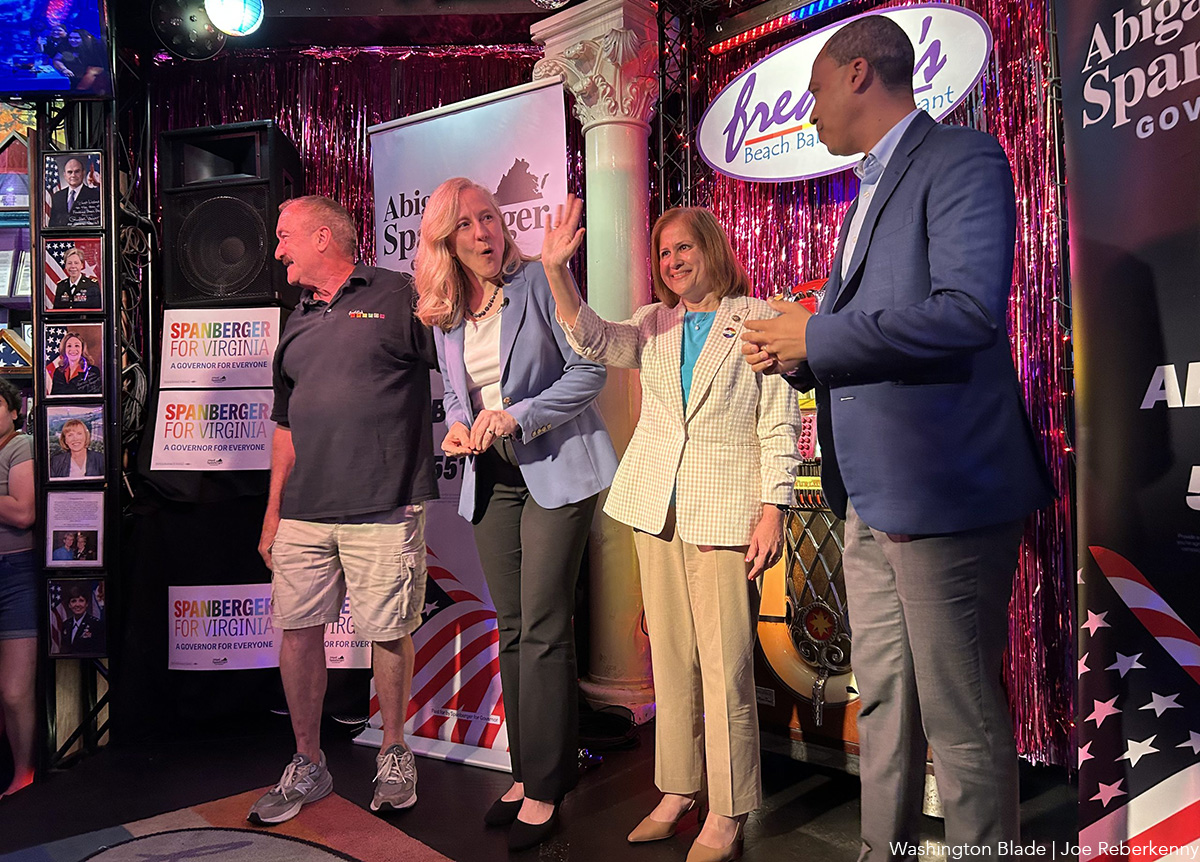
Freddie’s was packed wall-to-wall with supporters, many of whom wore “Spanberger for Virginia” shirts in the progressive Pride flag colors. In her speech, she made it clear that LGBTQ Virginians’ rights are on the ballot this year.
“I’m so excited to be here, and I am so grateful to the entire staff of Freddy’s for letting us overtake this incredible venue that is not just an awesome place to come together in community, but is a symbol to so many people of joy, of happiness, of community and of celebrating our friends and our neighbors,” Spanberger told the packed restaurant. “It is exciting to be here, and particularly during this Pride month, and particularly as we reflect on the 10-year anniversary of Obergefell and the reality that we still have so much work to do.”
“The reality is there are so many people who still would be inclined to take us backwards,” she said. “In this moment when we see attacks on people’s rights, on people’s humanity, on Virginia, on our economy, on research, on public education, on food security, on health care, on Virginians, on their jobs, on public service and on people — it can get heavy.”
“What it does for me is it makes me want to double down, because once upon a time, when I was talking to my mother about some horror show or sequence of activities coming out of a particular administration, she did not really have the patience to listen to me and said ‘Abigail, let your rage fuel you’ — and the conversation was over. And so I reflect on that, because, in fact, every day there is so much fuel to be had in this world and in this moment.”
One of the points Spanberger continued to emphasize was the importance of steadfast state government officials following the election of President Donald Trump, which has led to rollbacks of LGBTQ and bodily autonomy rights as a result of the conservative-majority U.S. Supreme Court.
“What the past few years have shown us is that a Supreme Court decision, no matter how many years we have celebrated its existence, does not protect us in the long term. And so as governor, I will work to make sure that every protection we can put in place for the dignity, the value, and the equal rights of all Virginians is a priority.”
During her speech, Spanberger highlighted several of the key values driving her campaign — protecting reproductive freedom and human rights, lowering healthcare costs, safeguarding Virginia’s environment, and ensuring that public education is affordable, accessible, and rooted in truth, not politics.
Spanberger went as far as to say that she wants to amend the state’s constitution to remove Section 15-A. “The reality is that in Virginia, we still have a ban in our state constitution on marriage equality. It is of the utmost urgency that we move forward with our constitutional amendment.”
“We will work to ensure that that terrible constitutional amendment, that was put in years ago, is taken out and updated and ensuring that Virginia is reflective in our most essential documents of who we are as a commonwealth, which is an accepting place that celebrates the vibrancy of every single person and recognizes that all Virginians have a place, both in that constitution and in law,” she added.
Following the event, two supporters spoke to the Washington Blade about why they had come out to support Spanberger.
“I came out because I needed to show support for this ticket, because it has been a particularly rough week, but a long few years for our rights in this country, in this state, with this governor, and it’s — we need to flip it around, because queer people need protection,” said Samantha Perez, who lives in Ballston. “Trans people need protection. Trans kids need protection. And it’s not gonna happen with who’s in Richmond right now, and we just need to get it turned around.”
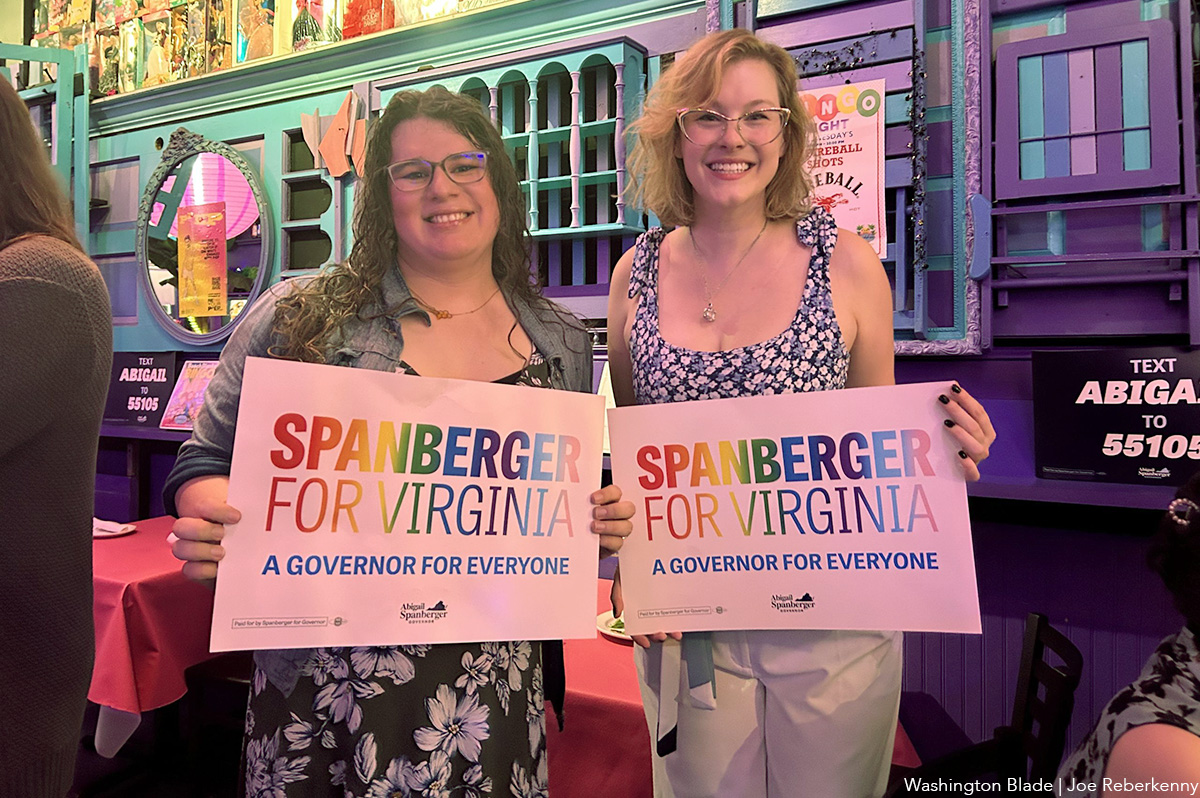
“The whole neighborhood’s here. All our friends are here,” said Annie Styles of Pentagon City. “It means the world to me to take care of each other. That’s what a good community does. That’s not what we’ve had with the Republicans here or across the nation for a really long time. It’s time to show that care. It’s time to make sure that good people are in a position to do good things.”
District of Columbia
Activists protest outside Hungarian Embassy in DC
Budapest Pride scheduled to take place Saturday, despite ban

More than two dozen activists gathered in front of the Hungarian Embassy in D.C. on Friday to protest the country’s ban on Budapest Pride and other LGBTQ-specific events.
Amnesty International USA Executive Director Paul O’Brien read a letter that Dávid Vig, executive director of Amnesty International Hungary, wrote.
“For 30 years Budapest Pride has been a celebration of hope, courage, and love,” said Vig in the letter that O’Brien read. “Each march through the streets of Budapest has been a powerful testament to the resilience of those who dare to demand equality, but a new law threatens to erase Pride and silence everyone who demands equal rights for LGBTI people.”
“The Hungarian government’s relentless campaign against LGBTI rights represents a worrying trend that can spread normalizing division and hatred,” added Vig. “Thank you for standing with us when we refuse to be intimidated.”
Council for Global Equality Chair Mark Bromley and two of his colleagues — Stephen Leonelli and Keifer Buckingham — also spoke. Health GAP Executive Director Asia Russell and Chloe Schwenke, a political appointee in the Obama-Biden administration who worked for the U.S. Agency for International Development, and Planned Parenthood staffers are among those who attended the protest.
(Washington Blade video by Michael K. Lavers)
Hungarian lawmakers in March passed a bill that bans Pride events and allow authorities to use facial recognition technology to identify those who participate in them. MPs in April amended the Hungarian constitution to ban public LGBTQ events.
Budapest Pride is scheduled to take place on Saturday, despite the ban. Hundreds of European lawmakers are expected to participate.
“Sending strength to the patriotic Hungarians marching tomorrow to advance human dignity and fundamental rights in a country they love,” said David Pressman, the gay former U.S. Ambassador to Hungary, on Friday on social media.
Sending strength to the patriotic Hungarians marching tomorrow to advance human dignity and fundamental rights in a country they love. Szabadság és szerelem. My past remarks on Budapest Pride: https://t.co/y1QhA9QouA
— David Pressman (@AmbPressman) June 27, 2025
-

 U.S. Supreme Court3 days ago
U.S. Supreme Court3 days agoSupreme Court upholds ACA rule that makes PrEP, other preventative care free
-

 U.S. Supreme Court3 days ago
U.S. Supreme Court3 days agoSupreme Court rules parents must have option to opt children out of LGBTQ-specific lessons
-

 National5 days ago
National5 days agoEvan Wolfson on the 10-year legacy of marriage equality
-

 Congress4 days ago
Congress4 days agoSenate parliamentarian orders removal of gender-affirming care ban from GOP reconciliation bill










